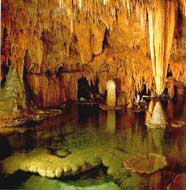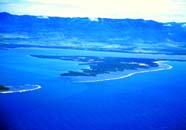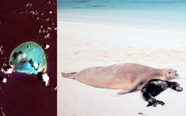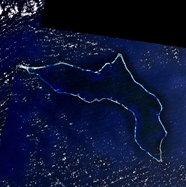| |
Glossary of Coral Reef Terminology - K
kairomone - a class of pheromone which is an interspecific chemical secretion that benefits the receiver but not the emitter; also defined as a pheromone produced by organisms to attract a mate, though in some cases can also undesirably attract the attention of a predator |
Karst - a limestone terrain characterized by sinks, caverns, abrupt ridges, protuberant rocks and drainage characteristics due to greater solubility of limestone in natural waters than is common. The term is derived from the geographical name of part of Slovenia |

A karst cave. Karst ecosystems are rich in water and mineral resources, and provide unique habitats to numerous fish and wildlife.(Photo: USFWS)
|
Karst cave - a cave caused by dissolution of limestone by water |
karyogamy - a process of fusion of the nuclei of two sex cells or gametes; the second step in syngamy |
karyokinesis - the cellular process of nuclear division |
karyology - the study of the nucleus of a cell |
karyolysis - the disintegration and dissolution of a cell nucleus upon death of the cell |
karyorrhexis - the rupture of a cell nucleus, releasing disintegrated chromatin |
karyotype - the entire chromosome complement of an individual cell, as seen during the mitotic phase |
Kelvin scale - an absolute scale of temperature in which each degree equals one kelvin. Water freezes at 273.15 K and boils at 373.15 K |
kenozooid - a small bryozoan heterozooid that strengthens and supports the colony, as well as fill spaces; long, branching, tubular, transparent stolons which extend above the substratum and to which the feeding individuals (autozooids) are attached |
keramidine - a bioactive compound isolated from the marine sponge Agelas sp. It is a neurosuppressive compound (a serotonergic receptor antagonist that blocks serotonin-mediated communications among neurons) which has potential as a drug for treatment of neurological disorders |
ketone - any of a class of organic compounds that is produced during fat metabolism. Ketones contain a carbonyl group, CO, attached to two alkyl groups, such as CH3COCH3 |

A number of small keys (cays) in Jobos Bay, Puerto Rico.
|
key - a small, low coastal island or emergent reef of sand or coral; flat mound of sand and admixed coral fragments built upon a reef flat or just above high tide level. A synonym of cay |
key character - in taxonomy, a diagnostic character used in a taxonomic key |
key factor analysis - a statistical treatment of population data designed to identify factors most responsible for change in population size |
key stimulus - in ethology or animal behavior, the stimulus which releases a fixed action pattern |
keystone predator - the dominant predator or the top predator that has a major influence on community structure |
keystone species - a species that is disproportionately important in the maintenance and balance of its community integrity |
kilobase (kb) - a length unit equal to 1000 base pairs of a double-stranded nucleic acid molecule; 1000 pairs of nucleotide bases in DNA |
kinetic energy - energy associated with motion |
kinetics - the study of acceleration, motion, or rate of change |
kinetochore - a structure forming at the centromere during mitosis for binding microtubules; a platelike structure necessary for chromosomal movement during mitosis; it develops on the centromere and links the chromosomes to the mitotic spindle |
kingdom - in taxonomy, the highest ranked category in the taxonomic hierarchy. All organisms are classified into one of five kingdoms: Monera (the prokarytic Kingdom. Includes archaebacteria, eubacteria and cyanobacteria); Protista (unicellular eukaryotes); Fungi (yeasts and mushrooms); Plantae (plants); and Animalia (animals). Some scientists recognize slightly different classification schemes |
kinocilium - a minute short cellular hair-like process (microvillus) responsible for locomotion in motile unicellular organisms, or in higher forms, generates a current of fluid |
Kiribati - an island nation (Republic of Kiribati) located in the central tropical Pacific Ocean. It is composed of 32 atolls and one raised coral island dispersed over 3,500,000 km2 (1,351,000 square miles) straddling the equator and bordering the International Date Line to the east. The Gilbert Islands were granted self-rule by the United Kingdom in 1971 and complete independence in 1979 under the new name of Kiribati. The name Kiribati is the local pronunciation of "Gilberts," derived from the main island chain, the Gilbert Islands |
kleptoparasitism - stealing from one animal by another; also called "piracy" |
knee root - an aerial root of a mangrove that emerges from the ground then loops back in. It is also called a peg root. It is not clear whether knee roots have a role in respiration |
knob - a circular, rounded projection or protuberance that sticks out from a surface; a projecting structure on the reef margin or reef front wherein the upper surface flares outward, giving the surface a greater diameter then the basal section |
knoll - a small reef within the lagoon or on shallow shelves |
knot - The unit of speed used in navigation that is equal to 1 nautical mile (6,076.115 ft or 1,852 m) per hour |
Knowledge Management (KM) - an emerging management discipline oriented toward creating and applying an organization's knowledge assets; a new branch of management for achieving breakthrough performance through the synergy of people, processes, and technology. Its focus is on the management of change, uncertainty, and complexity. KM caters to the critical issues of organizational adaptation, survival, and competence in face of increasingly discontinuous environmental change. It embodies organizational processes that seek synergistic combination of data and information processing capacity of information technologies, and the creative and innovative capacity of human beings |
Koch’s Postulates - to establish the specificity of a pathogenic microorganism, it must be present in all cases of the disease, inoculations of its pure cultures must produce disease in animals, and from these it must be again obtained and be propagated in pure culture |
Krebs cycle - a series of enzymatic reactions in mitochondria involving oxidative metabolism of acetyl compounds to produce high-energy phosphate compounds that are the source of cellular energy ; also known as the tricarboxylic acid (TCA) cycle and as the citric acid cycle |

Photos: (Left) The Kure Atoll Reserve Preservation Area includes approximately 17 square nautical miles (57 square kilometers) of submerged coral reef habitats; (Right) An endangered Hawaiian monk seal and her pup. (Photos: NOAA)
|
Kure Atoll - the most remote of the Northwestern Hawaiian Islands, and the northern-most coral atoll in the world, located at the extreme northwest end of the Hawaiian archipelago. The atoll has almost 80,000 acres of coral reef habitat with 28 species of stony corals so far documented. Kure Atoll is an important pupping and resting area for Hawaiian Monk seals. The island is also a nesting area for smany species of sea birds, and a wintering area for a variety of migratory bird species from North America and Asia |

Kwajalein Atoll - NASA NLT Landsat 7 (Visible Color) Satellite Image. (Photo: NASA)
|
Kwajalein Atoll - the largest atoll in the Republic of the Marshall Islands. Kwajalein Atoll has the world's largest lagoon (839.30 km² ) and is comprised of 97 islets with a land area of 6.33 km² . Kwajalein Atoll has been used as a U.S. military base since 1944 |
Kyoto Protocol - an agreement made under the United Nations Framework Convention on Climate Change (UNFCCC). Nations that ratify this protocol make a commitment to reduce their emissions of carbon dioxide and and five other greenhouse gases or engage in emissions trading if they maintain or increase emissions of these gases |
|
|
|
|

